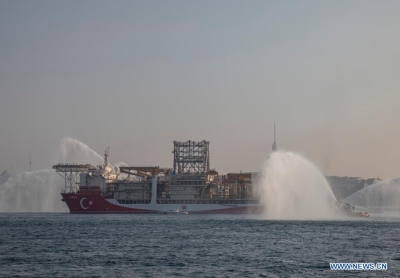Ankara, Dec 28 : Turkey has revised up its natural gas recoverable reserves in the Sakarya gas field off the Black Sea coast after a re-evaluation work in the existing wells and a new discovery in the field, Energy and Natural Resources Minister Fatih Donmez said.
The total amount of recoverable reserves in this field is now calculated to be 710 billion cubic meters (bcm), Donmez said at a media briefing.
The country announced its first discovery in the Black Sea with 405 bcm reserves in the Tuna-1 well in 2020 and made its second discovery with the Amasra-1 well with 135 bcm in 2021, thus the initial prediction of reserves in the Sakarya gas field was 540 bcm, Xinhua news agency quoted the Minister as saying.
The amount of recoverable reserves in the existing Sakarya field was revised up from 540 bcm to 652 bcm thanks to the appraisal work carried out by an international energy company, the minister explained.
Turkey’s drill vessel Fatih discovered additional 58 bcm reserves in the Caycuma-1 well located in the northwest of the Sakarya gas field, he added.
In addition, a new natural gas reserve of 58 bcm in the Black Sea was discovered, announced Turkish President Recep Tayyip Erdogan on Monday.
Turkey has drilled 10 wells so far with three vessels, and the plan is to reach a total of 30 wells and complete drilling operations by 2026, said Donmez.
They aim to pump the first gas from reserves in the Black Sea to the main grid by the end of March in 2023, the Minister added.
Currently, the onshore processing facility can operate at a capacity to process 10 million cubic meters of gas per day in the first phase and the infrastructure has been prepared in a way that it will process 40 million cubic meters of gas in the second phase, Donmez explained.
The Turkish government hopes Black Sea gas reserves would provide 25-30 per cent of the national energy demand by 2026.
Turkish announcement for boosting gas reserves comes at a critical time amid efforts to diversify away from its dependence on oil and gas imports.
Record-high energy prices and inflation around the globe have hit Turkey severely, as the country depends mostly on imports for its energy-dependent economy and has made four rounds of natural gas price increases this year.
The country buys most of its natural gas through pipelines from Russia, Iran, and Azerbaijan, in addition to some liquid natural gas (LNG) imports, mainly from Qatar and the US.
To solve the problem, Turkey has long been looking for alternative energy sources.
A nuclear reaction construction has started with a few others planned and the search continues for untapped gas reserves, particularly in the Black Sea and the Mediterranean Sea.
Turkey’s gas consumption was 50.86 bcm in 2021 and is estimated at 60.44 bcm this year, according to the country’s Energy Market Regulatory Authority.
#Turkey #revises #offshore #fields # Arya #Jan #Arya #Kara #Russia #Turkish







